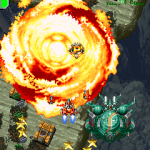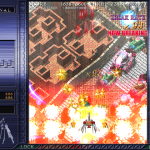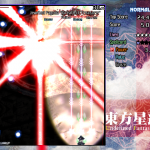I’ve been thinking a bit about the role of bombs in SHMUPS, and why they are always there. While I have never been a fan of doing things “because all the other games do them”, the more I have thought about the bombs, the more I have realized just how many problems they solve in ingenious ways. This has been floating around in my head a lot lately, but a recent conversation with a friend brought it to the fore. It made me realize that not everyone appreciates bombs as I do!
Intolerable!
Clearly the only way this could possibly be resolved is via an overblown blog post. To the internets!
First, let’s define what sorts of bombs I’m talking about. The have several important qualities: First, and foremost, they remove all immediate threat to the player for a short time. Frequently this is done by making the player invincible, and/or removing a significant portion of the bullets and enemies from the screen. Second, they inflict greater than normal damage to enemies. (i. e. Greater than if the player just kept shooting rather than use a bomb.) Third, they are easily deployed, typically via a dedicated button. And finally, they are a very limited resource, with hard limits on how frequently the player can employ them.
So what makes them so great? Well, to answer that, let’s think about some problems in SHMUP development…
Fairness and Impossible Situations
One big pitfall is the player’s perception of fairness. Players don’t like it if they think they have no way to survive. That’s the sort of thing that makes players stop playing. So naturally, when designing enemy attacks, the designer wants to make sure that it is, in some way, avoidable. But more importantly, not only should it be avoidable, but the player has to know it is avoidable. It doesn’t matter if there is a secret way to survive. If the player doesn’t know it’s there and can’t figure it out, it might as well not exist.
The problem is that it’s not always something that is deterministic from the designer’s point of view. The designer can’t control what the player realizes. And because it’s common to have attacks that vary based on things like player position, or random variance, it is almost impossible to predict exactly what sorts of situations players will get themselves in to. Maybe they didn’t lead a stream of bullets correctly. Maybe the random number generator happened to launch bullets in a straight line, forming an impenetrable wall. Maybe they just found an edge case you didn’t think of.
Bombs then, serve as a safety valve. They are similar to combo-escapes in fighting games. They are protection against the developers not realizing how nasty something ca be, and empowering the players to survive it anyway. They mean that the developer gets to know that even if something like that does happen, the player has a recourse, and won’t just shake their fist to the heavens, turn off their computer and never play again.
Individual Difficulty
Another problem: Player A thinks boss 1 is laughable, and boss 2 is impossible. Player B thinks boss 2 is easy, and boss 1 is god’s punishment for an unjust world. Clearly the designer can’t just make both bosses easier, since that just reduces the game’s challenge to the least common denominator, and risks alienating both players.
Maybe you look over the data and realize that every player has, on average, at least one problem area. Maybe it’s not always even a boss. A challenge in the game they just can’t seem to deal with. What to do?
You could go crazy trying to smooth all those spots out, to try to make everyone happy.
Or, you could make your players do it for you. Imagine – what if you could give each player a ‘make one spot easier’ card, usable once, which would make one area of the game significantly easier. Each player would most likely use it on the spot that was giving them the most trouble.
And clearly, what is a bomb but a “skip this hard part” button? How effective it is can be tuned and tweaked, ranging from “I would like to survive this hail of bullets” to “please transform this formidable boss-level enemy into a smoldering pile of twisted metal and regret.” The effectiveness can be tuned, but the net effect is constant: Players can selectively skip a limited number of situations.
Which from a design standpoint is great! In addition to smoothing out the extremes in what players find difficult, it also means that the player actually has an active hand in tuning the game difficulty their preference and can move on past things they find too hard. They get an extra interesting choice in gameplay, everywhere: Use a bomb to survive, or try to dodge and save the bomb for later? It’s like the star/coin requirements in modern Super Mario Games. Or the branching world map, in older ones. Beating every challenge is not necessary to progress, as long as you beat enough of them.
Of course, not TOO many. Can’t be giving them unlimited bombs or anything. But the really neat part is that the limits on bombs don’t matter as much as you might think. Because no matter how much you limit the players, that’s nothing compared to how much they will limit themselves. It is amazing how many players die with full bombs because they were “saving them until they really needed them” and did not realize that this moment was already upon them. Players seem to understand, on some subconscious level, that using a bomb to make it through a challenging is the coward’s path. You generally don’t need to worry about players skipping your neat areas with bombs because they will move towards that goal of their own. Every player yearns to be the guy who deftly weaves between attacks and emerges unscathed.
Sub-1-ups
Finally, bombs also occupy a unique place in the totem pole o’ powerups. Bombs are clearly less important than 1-ups (since you usually get your bombs back when you die) but are clearly more important than most other things, like random points. They make a nice mid-level powerup for the designer, for when they want to give the player some kind of meaningful reward, but don’t want to drop a full 1-up on them.
In some ways, they are effectively quasi-1-ups. They are 1-ups that only function if the player passes a skill check, and reacts in time to save themselves from death. You could even describe them as the vilest sort of quicktime event: “Press B to not die!” Except in the case of bombs, they’re fun and cool, instead of lame.
In conclusion
Bombs are awesome.
I hadn’t really appreciated how many ways they were useful, but it is increasingly apparent to me why so many games include them. It’s not just because “SHMUPS have bombs, need bombs if you want to make a SHMUP”. It’s that they have an impressive number of befits, and minimal implementation cost, and if you skip them, you have to start thinking of other solutions to these problems.
Good stuff!


